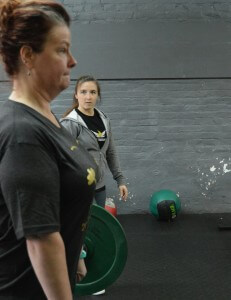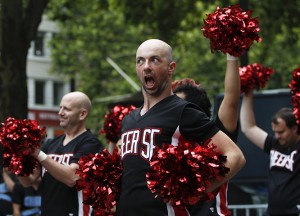
Coaching involves the one-on-one attention to detail every athlete deserves
It is fairly impossible not to agree that in order to have the best CrossFit experience, you must find a gym that has coaches who actually. . . well. . .coach. Countless articles have been written about whether or not a Level 1 makes a CrossFit coach, or on the fundamentals needed to provide the instruction necessary to facilitate a healthy, long lasting CrossFit experience. At CrossFit Prelude, we view our coaches as more than just cheerleaders. Instead, they are masters of movement with the sole purpose of fully educating the members of our school.
Merriam-Webster’s Dictionary provides you with three definitions of a coach:
- A person who teaches and trains an athlete or performer;
- A person who teaches and trains members of a sports team and makes decisions about how the team plays during games; or
- A private teacher who gives someone lessons in a particular subject.
These three definitions provide a reasonable foundation upon which to begin the evaluation of a coach. Athletes who train at the primary, secondary, and Collegiate level, often encounter many coaches with varying styles and methods of instruction. The same holds true for anyone that takes part in a fitness journey. What remains constant, however, is that a coach should focus on a systematic method of instruction, which allows athletes to become proficient in their specific sport, while reducing injury.
In any sport, and particularly CrossFit, the instruction you receive from a coach is paramount to all other considerations. If you are incorrectly instructed, or have not been taught the foundational movements to a degree of proficiency necessary to become even marginally adept at performing the more complex CrossFit domains, then how can you safely and efficiency reach your goals? In other words, you cannot be taught a complex Olympic lift such as a clean, without first being taught, correctly, how to pull weight from the ground during a deadlift. Although the clean and snatch may be more exciting to watch, you must take the steps necessary to work up to a safe level of proficiency. It is your coach’s job to help you along the way, and slow you down when you are not ready to advance (see second bullet above).
Another common misconception, and unfounded belief, is that a coach’s primary function is to be a motivator (the workout cheerleader). “Good Job,” “Great,” and “Keep it Up,” while important, are not actionable instructions, and ignore the most important aspects: Seeing, Moving, Cuing, and Correcting, these are the lifelines of good quality coaching. During the heat of a workout, it is easy for you to miss the fact that you were not taught how to perform a movement correctly while your coach is yelling at you to go faster, or work harder. This is magnified with the sometimes competitive nature of CrossFit. Initially, the workout cheerleader will have you leaving your box feeling as though you had a great workout; that she really pushed you through those last reps; and you could not have done it without her motivation. But this is not the job of your coach. This is what your CrossFit Community is supposed to do. Your CrossFit Community is the cheerleader and, just like in any sport, the coach’s job is to ignore the cheerleaders, and pay attention to what is happening on the field of play. You may not have realized that your form deteriorated during the workout to a point where safety was an issue. Additionally, and sometimes readily apparent at some CrossFit facilities, you may not have been performing the movements correctly in the first place. Nonetheless, the euphoric state you have because you “pushed yourself towards your breaking point” will be short lived and, more likely than not, followed by a host of aggravating injuries including back, shoulder, and knee pain. I am not, however, saying that your coach is not supposed to push you hard during your workout. What I am saying is that your coach’s primary role is to ensure you are performing movements safely, and to prepare you to utilize those movements during a workout while in a fatigued state.

Leave the cheering to your members, a coach’s job is to provide actionable cues, and to ensure athlete’s have been trained to perform movements safely, while in a fatigued state.
As an athlete it is incumbent upon you to ask yourself a couple of significant questions when evaluating the coaching you are receiving:
1. Are you getting yelled at to pick the bar back up, or are you receiving actionable cues from your coach during your workout, including when to take breaks?
2. Is your coach actually coaching you through each and every movement during every aspect of your training. In other words, is your coach providing instruction during the WOD, or are they merely just standing around, or simply “watching” as if they are just there?
3. If you receive coaching cues during your workout, do you fully understand what the cues mean, are they actionable, and has your body, over time with practice and training, developed the necessary adaptation through consistently mechanically correct repetitions?
4. Have you been safely progressed through the movement you perform in a workout, and has your coach consistently demonstrated a commitment to your development as an individual athlete, or are you just a number in a sea of athletes?
While a coach’s job is to motivate and inspire, it is more than just yelling. Motivation extends past the mere cursory instruction on a lift, and leaving you to your own peril during a workout. Above all else, coaches have an obligation to ensure you are prepared to have the best experience when you hit the playing field of the CrossFit gym. To demonstrate anything less, is a disservice to you as an individual athlete, as well as CrossFit as a whole.
To find out what makes our coaches a cut above the rest click HERE to schedule your FREE one-on-one introductory session.
CrossFit Prelude. “The Beginning of Something Better.” What Is Your Something?
3306 East Marshall Street, Richmond, Virginia 23223
